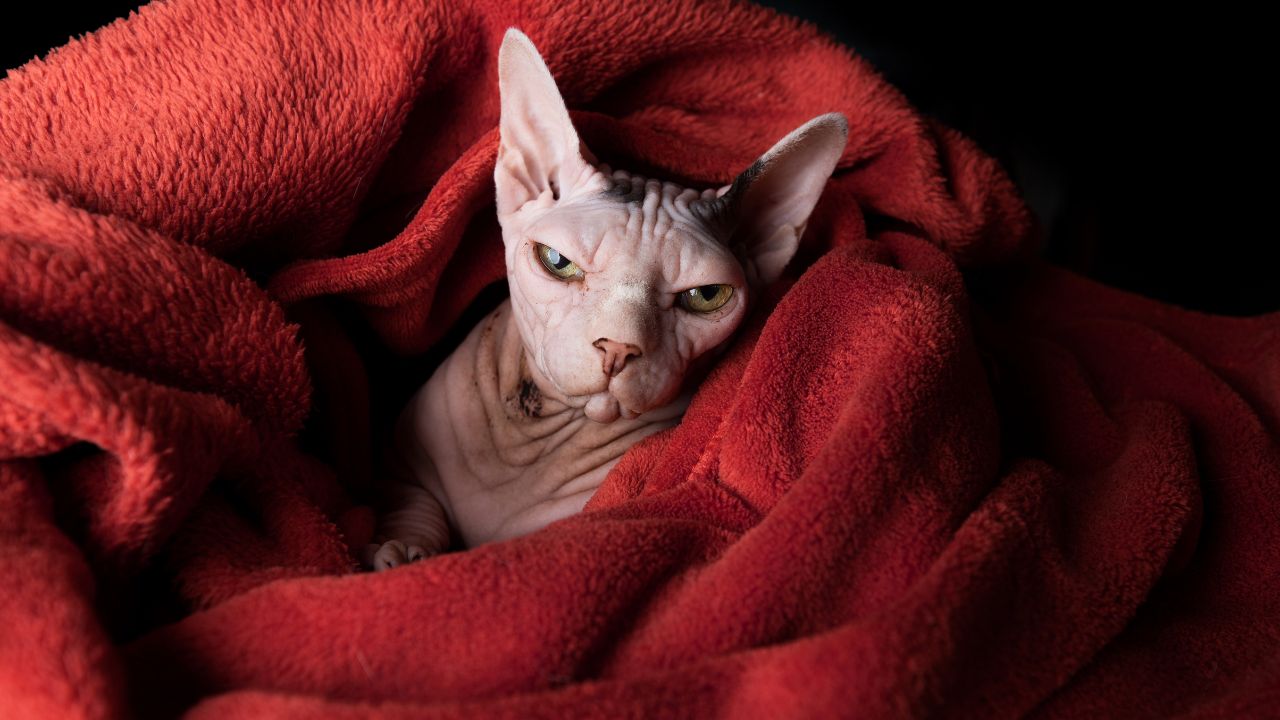Are you considering adopting a Sphynx cat but concerned about allergies? Sphynx cats are often marketed as hypoallergenic due to their lack of fur, but is this really the case? In this article, we’ll explore whether Sphynx cats are truly hypoallergenic and what you need to know before bringing one home.
First, it’s important to understand what hypoallergenic means. Hypoallergenic refers to a substance that is less likely to cause an allergic reaction. While Sphynx cats do produce less dander than other cat breeds, they are not completely allergen-free. Cats produce a protein called Fel d 1, which is found in their saliva, skin, and urine. Even hairless cats like Sphynx cats can still produce this protein, which can trigger allergic reactions in some people.
So, are Sphynx cats a good choice for people with allergies? While they may be less likely to cause an allergic reaction, it ultimately depends on the individual. Some people with cat allergies may still react to Sphynx cats, while others may have no issues. It’s important to spend time with the cat before adopting to see how your body reacts.
What Makes Sphynx Cats Hypoallergenic?
If you’re looking for a hypoallergenic cat, you may have come across Sphynx cats. These hairless cats are often touted as being hypoallergenic, but what exactly makes them so? Let’s take a closer look at the factors that contribute to the Sphynx cat’s hypoallergenic reputation.
The Role of Fel d 1 Protein
One of the primary causes of cat allergies is a protein called Fel d 1, which is found in a cat’s skin, saliva, and urine. When a cat grooms itself, the protein can become airborne and trigger allergic reactions in sensitive individuals. While Sphynx cats do produce Fel d 1, they produce less of it than other breeds due to their lack of fur. This means that Sphynx cats are less likely to trigger allergic reactions in people who are sensitive to Fel d 1.
The Hairless Trait
Sphynx cats are a hairless breed, which means they have less hair to shed than other cats. While all cats produce dander, which is a common allergen, Sphynx cats produce less dander than other breeds due to their lack of fur. This can make them a good choice for people with allergies, as there will be less dander in the environment to trigger allergic reactions.
In addition to producing less dander, Sphynx cats also require less grooming than other breeds. They don’t need to be brushed or combed, as they don’t have fur to tangle or mat. However, they do need to be bathed regularly to remove excess sebum, which can build up on their skin and cause skin problems.
Overall, while Sphynx cats are not completely allergen-free, they are often considered to be hypoallergenic due to their low levels of shedding and dander production. If you’re considering getting a Sphynx cat and have allergies, it’s important to spend time with the cat before bringing them home to ensure that you don’t have any allergic reactions.

Special Care
While Sphynx cats are relatively low-maintenance in terms of grooming, they do require special care due to their lack of fur. For example, they are more prone to skin infections and sunburn, so they need to be kept out of direct sunlight and monitored for any signs of skin problems. They may also need to wear clothing to keep them warm in colder weather.
In addition to their special care needs, Sphynx cats are known for their affectionate and attention-seeking personalities. They crave attention and love to be around their owners, so they may not be the best choice for someone who is looking for a more independent cat. However, with plenty of toys and high-quality food, Sphynx cats can make wonderful pets for the right person.
Overall, if you’re looking for a hypoallergenic cat, Sphynx cats are definitely worth considering. While they do require some special care and attention, they are often a good choice for people with allergies who want a loving and affectionate pet.
Sphynx Cat Care for Allergy Sufferers
If you are an allergy sufferer who wants to add a Sphynx cat to your family, you need to know how to take care of them properly. Here are some tips to help you care for your Sphynx cat and reduce the risk of allergic reactions.
Bathing and Grooming
Sphynx cats need regular bathing and grooming to keep their skin clean and healthy. Since they have no fur, they tend to accumulate oils and dirt on their skin, which can cause skin problems and infections. You should bathe your Sphynx cat at least once a week using a mild shampoo and warm water. You can also use cat cleaning wipes to clean their skin in between baths.
Cleaning Your Home
To reduce the risk of allergic reactions, you need to keep your home clean and free of cat dander. You should vacuum your floors and furniture regularly using a vacuum cleaner with a HEPA filter. You can also use an air purifier to remove airborne allergens from your home. Wash your cat’s bedding and toys regularly using hot water and a hypoallergenic detergent.
Special Diet
Sphynx cats need a high-quality diet to maintain their health and reduce the risk of obesity and other health issues. You should feed your cat a diet that is high in protein and low in carbohydrates. You can also add supplements to their diet to improve their skin and coat health.
Regular Vet Visits
Sphynx cats need regular checkups and vaccinations to maintain their health. You should take your cat to the vet at least once a year for a checkup and vaccinations. You should also monitor your cat’s skin and ears for any signs of infections or other health issues.
In conclusion, Sphynx cats are a great choice for allergy sufferers who want a pet. However, they require special care to keep them healthy and reduce the risk of allergic reactions. By following these tips, you can ensure that your Sphynx cat is healthy, happy, and allergy-free.
Symptoms of Allergic Reaction to Sphynx Cats
While Sphynx cats are often considered to be less allergenic than other breeds, they are not completely hypoallergenic. People who are allergic to cats may still experience symptoms when exposed to Sphynx cats. Here are some common symptoms of an allergic reaction to Sphynx cats:
-
Sneezing: One of the most common symptoms of a cat allergy is sneezing. If you are allergic to Sphynx cats, you may find yourself sneezing frequently when you are around them.
-
Runny or stuffy nose: Another common symptom of a cat allergy is a runny or stuffy nose. If you are allergic to Sphynx cats, you may experience these symptoms when you are around them.
-
Itchy, watery eyes: Allergic reactions to Sphynx cats can also cause itchy, watery eyes. This can be uncomfortable and may make it difficult to see clearly.
-
Skin rash or hives: Some people may develop a skin rash or hives when they come into contact with Sphynx cats. This can be a sign of an allergic reaction and should be taken seriously.
-
Coughing or wheezing: Allergic reactions to Sphynx cats can also cause coughing or wheezing. If you experience these symptoms, it is important to seek medical attention.
It is important to note that these symptoms can vary in severity depending on the individual and the extent of their allergy. If you experience any of these symptoms when you are around Sphynx cats, it is important to talk to your doctor about the best course of treatment.
Conclusion
In conclusion, while Sphynx cats are often touted as hypoallergenic, it’s important to note that no cat breed is completely allergen-free. Sphynx cats produce less of the allergen protein Fel-D1 than other breeds due to their lack of fur, which can make them a better option for individuals with allergies.
However, it’s important to note that the lack of fur does not make them completely hypoallergenic. Some people may still experience allergic reactions to Sphynx cats. If you’re considering getting a Sphynx cat and you’re worried about allergies, it’s a good idea to spend some time with the breed before making a decision.
Additionally, it’s important to note that while Sphynx cats may produce less allergens, they still require regular grooming to maintain their skin health. This can include regular baths and ear cleaning to prevent wax buildup.
Overall, Sphynx cats can be a great option for individuals with allergies, but it’s important to do your research and spend time with the breed before making a decision. With proper care and attention, Sphynx cats can make wonderful pets for those with allergies.




